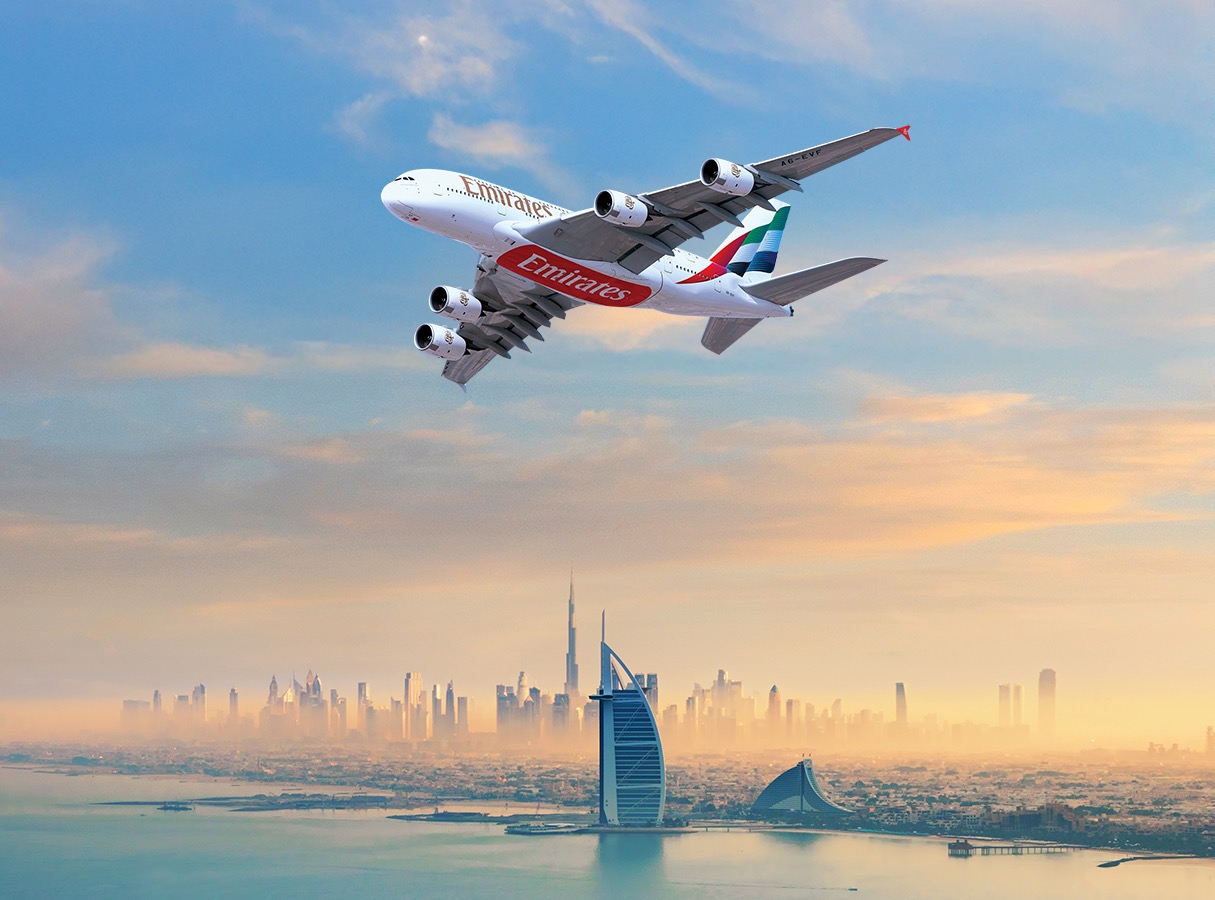
Emirates Group Posts Record Profits of US$ 6.2 billion in 2024-25
Emirates is the world’s most profitable airline, and Emirates Group the world’s most profitable aviation group in the 2024-25 reporting period
The Emirates Group has announced its strongest financial performance in history, posting a record annual profit of $6.2 billion for the fiscal year 2024–25. As global markets stabilize and international mobility rebounds, this milestone represents more than a financial triumph—it signals the return of confidence in long-haul business travel and positions Emirates as a cornerstone in the ecosystem of global commerce.
Led by its flagship airline, which contributed $5.8 billion in profits, the Emirates Group has emerged as the most profitable airline group in the world. Group revenue climbed to $39.6 billion, and the company reported a healthy EBITDA of $11.5 billion, underscoring operational strength and long-term resilience.
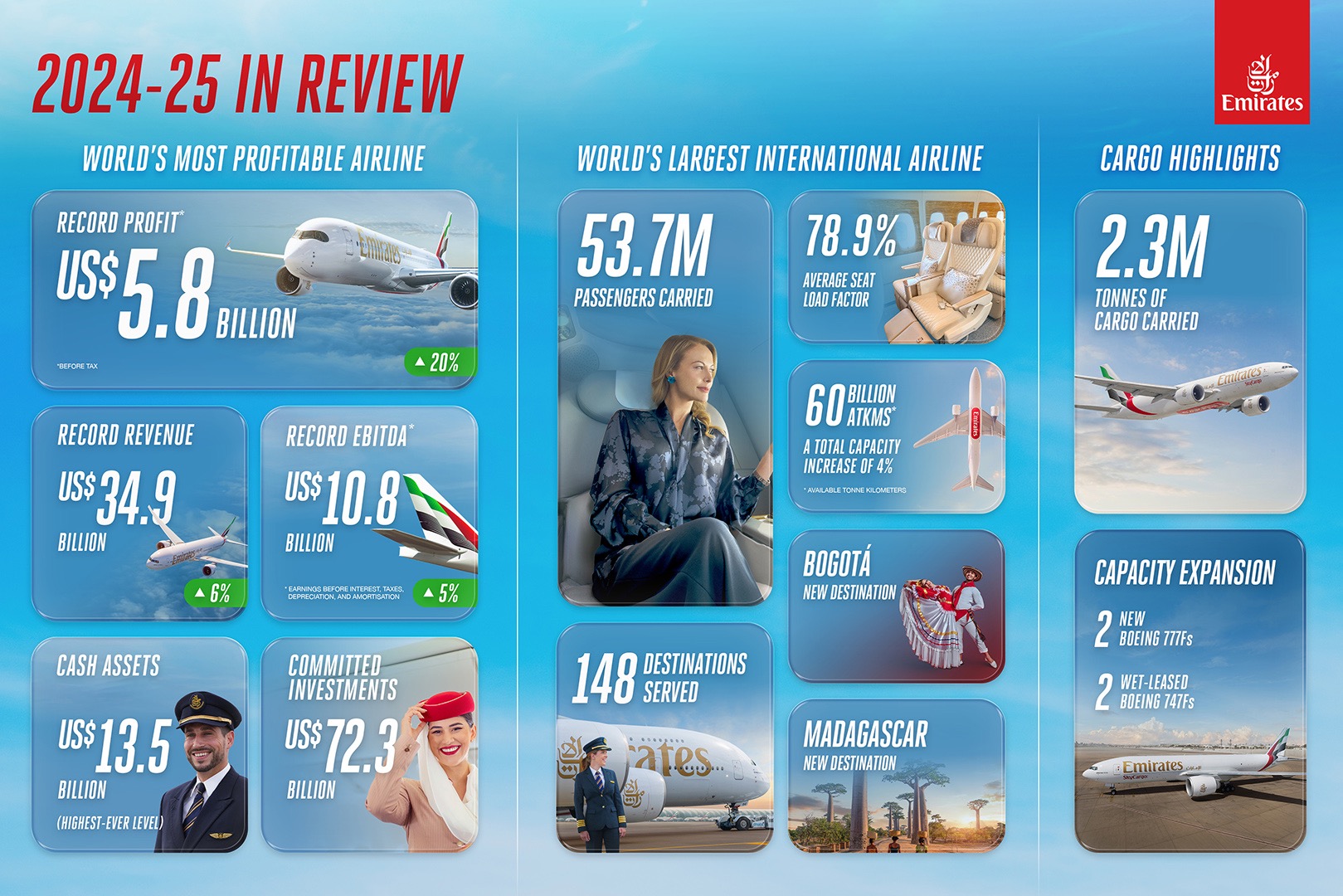
Passenger traffic surged, with Emirates carrying 53.7 million travellers to 148 destinations across 80 countries, reflecting not just a resurgence of demand but a sustained shift in how businesses are re-engaging across borders.
These results also reflect a wider trend in corporate mobility. Business travel, long seen as a bellwether for economic vitality, has staged a strong return, particularly along strategic corridors linking Asia, Europe, and North America. Emirates’ network strategy—emphasising bilateral access through 33 codeshare agreements and 118 interline partnerships—has enabled connectivity to more than 1,750 cities worldwide, simplifying complex itineraries for executives, entrepreneurs, and professionals who require efficiency and reliability
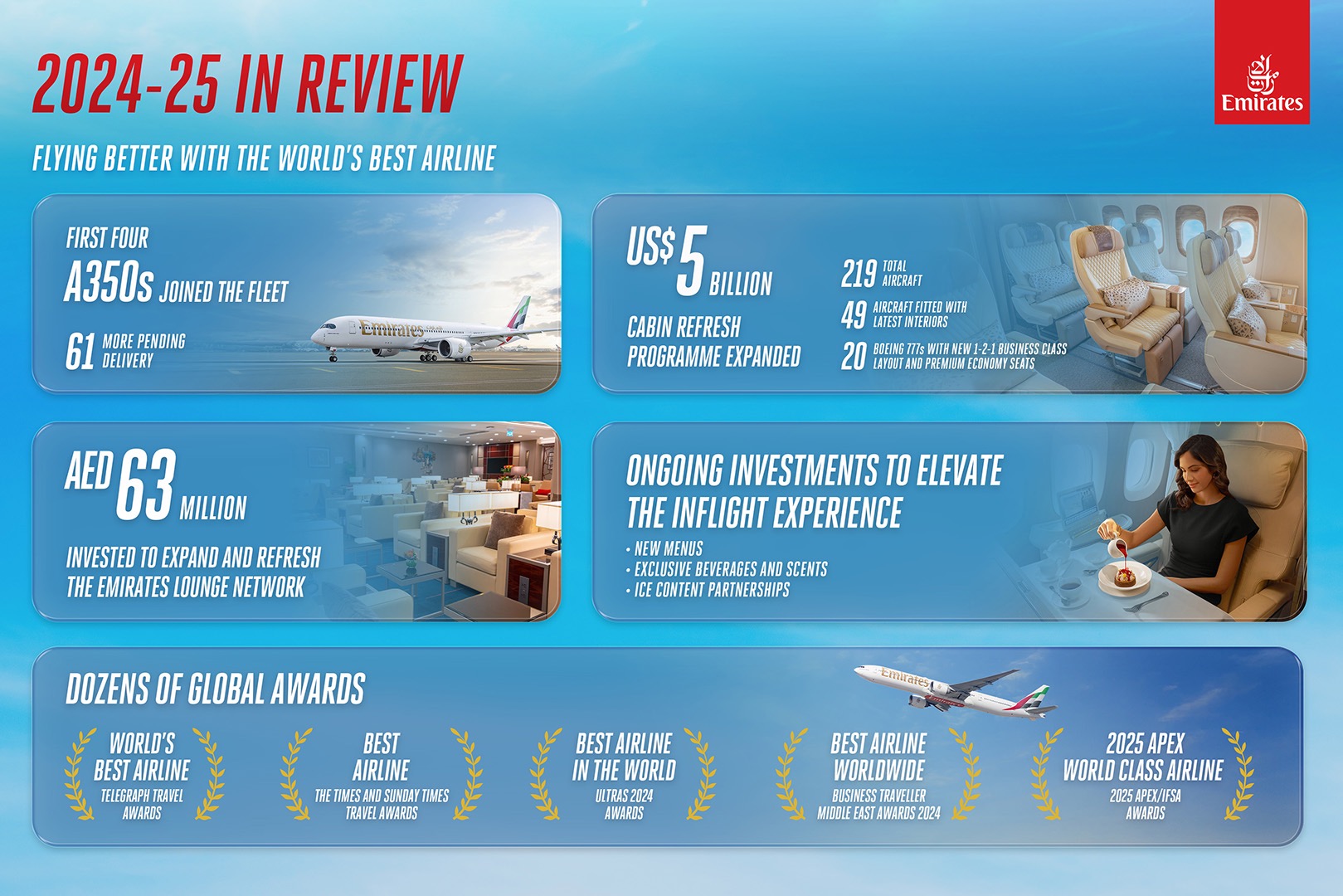
The Dubai-based airline is also expanding its geographic footprint with precision. In the past year, it launched new routes to Bogotá and Antananarivo, while reinstating high-value business destinations such as Lagos, Edinburgh, and Adelaide. In parallel, Emirates took delivery of new long-range aircraft and plans to introduce 20 additional aircraft—including 16 Airbus A350s and four Boeing 777 freighters—in the next fiscal year. The deployment of next-generation aircraft not only enhances environmental efficiency but also supports a more comfortable and connected travel experience, particularly in premium cabins where business travelers typically reside.
Investment in passenger experience has been a key theme throughout the year. Emirates’ $5 billion cabin retrofit program, covering 219 widebody aircraft, is aimed squarely at improving the First and Business Class experience. These upgrades are essential in a market where competition is fierce and traveler expectations are evolving. Executives now expect lie-flat beds, high-speed Wi-Fi, and the ability to transition seamlessly between time zones. Emirates has responded with significant investment in product consistency and innovation, while also introducing Premium Economy on more routes to cater to cost-conscious corporate travelers who still expect elevated comfort.
Physical infrastructure has also received a boost. New luxury lounges at London Heathrow and Jeddah signal a renewed focus on ground-level excellence, while the launch of Emirates World retail stores across the UAE brings the airline closer to its customers, both individual and corporate. These service enhancements are backed by strong demand for corporate accounts and frequent flyer loyalty, which remain crucial pillars in the business travel segment.
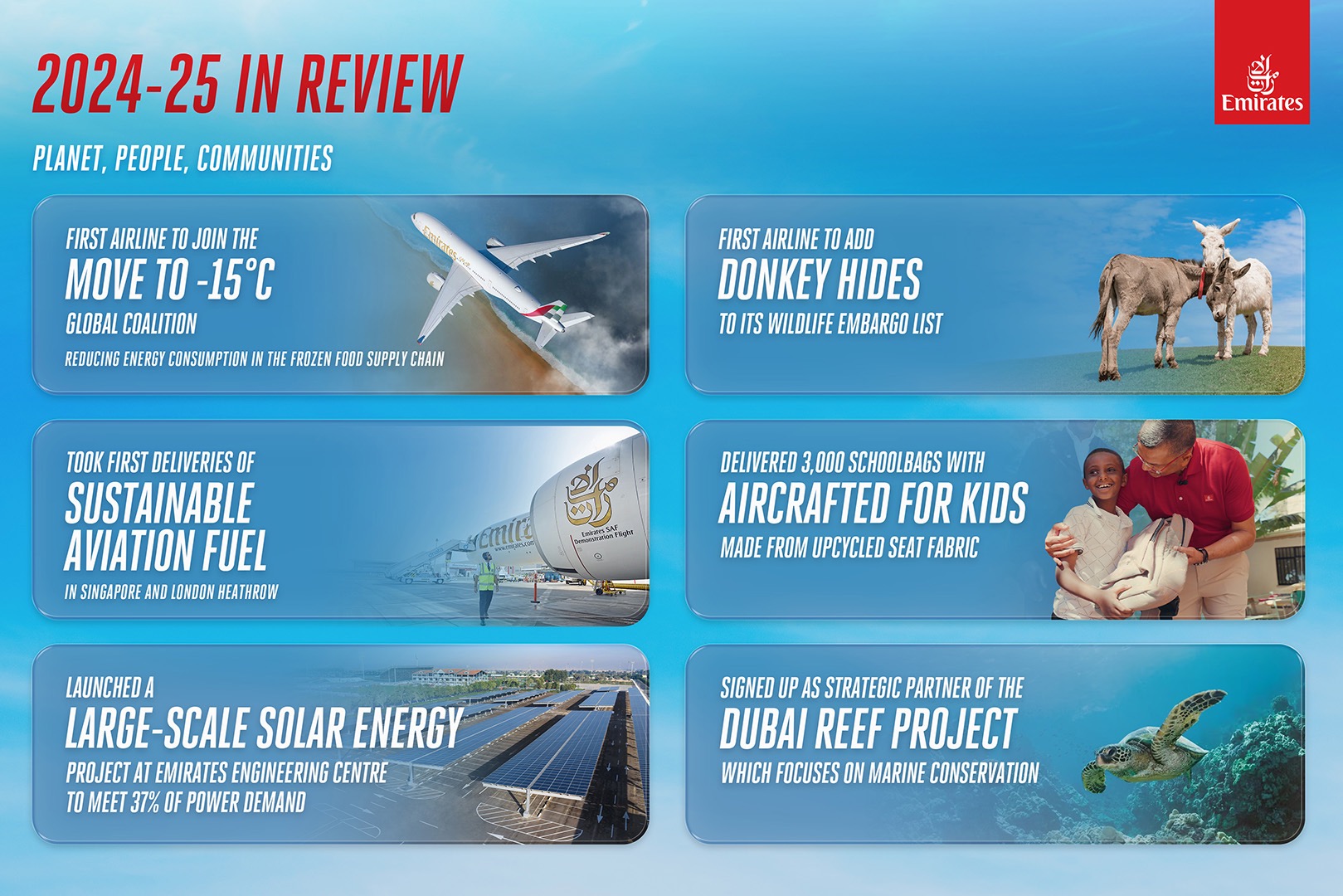
dnata—the Group’s ground services and logistics division—delivered strong results, generating $5.8 billion in revenue and $430 million in profit. With operations spanning 82 airports in 14 countries, dnata plays a critical support role in ensuring that Emirates' logistics and cargo functions continue to run smoothly, which is especially vital for sectors such as pharma, tech, and manufacturing where time-sensitive shipments often accompany corporate travel.
In the travel services segment, dnata saw a rebound as well, particularly through its Imagine Cruising brand and UK operations. This supports a broader narrative: the lines between business and leisure travel are blurring, and companies like Emirates are positioning themselves to cater to both. The airline’s agility in managing demand across multiple segments makes it not just a carrier of people, but a facilitator of global commerce.
Environmental sustainability has also come to the forefront of Emirates’ long-term strategy. The airline has begun using Sustainable Aviation Fuel (SAF) in select markets, including London and Singapore, and has launched solar power initiatives at its engineering facilities in Dubai. In an era where ESG compliance is increasingly scrutinized by institutional investors and global corporates, these efforts bolster the airline’s reputation as a future-ready operator.
From a workforce perspective, the Group has expanded its global headcount to over 121,000 employees, driven by increased flight operations, route expansion, and business diversification. Internal investments in digital HR platforms and performance-based incentives are designed to support long-term service excellence, which remains a critical differentiator in the competitive world of premium air travel.
For global business travelers, these developments translate into faster routes, more options, and better service. As companies reinvest in face-to-face engagement, international deal-making, and high-value client interaction, Emirates is positioning itself as the airline of choice. Its strategic hubs, diverse fleet, and premium offerings give it a commanding presence in corridors that matter—from New York to Mumbai, Johannesburg to Tokyo, London to Singapore.
In a world increasingly reliant on connectivity and speed, Emirates’ record performance is more than a fiscal headline—it is a barometer of confidence in global business travel. For decision-makers around the world, that’s a signal that the skies are not only open again, but brimming with opportunity.
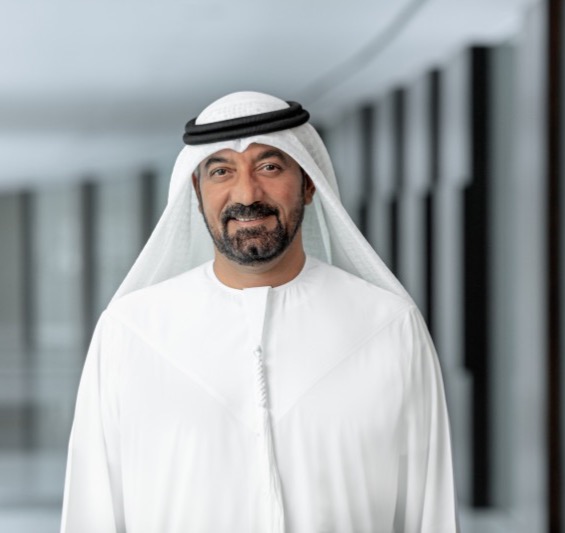
His Highness Sheikh Ahmed bin Saeed Al Maktoum, Chairman and Chief Executive, Emirates airline and Group said: “It is no accident that Dubai has produced hugely successful global aviation entities including Emirates and dnata. Dubai’s aviation sector has become an influential force on the global stage thanks to visionary leaders, strategic planning, co-ordinated execution, and strong support from our customers, business partners, and all the people of Dubai.”
Commenting on the outlook for 2025-26, Sheikh Ahmed said: “We enter the year ahead with excitement and optimism. Our excellent financial standing enables us to continue building on and scaling up from our successful business models. While some markets are jittery about trade and travel restrictions, volatility is not new in our industry. We simply adapt and navigate around these challenges.
“Emirates will strengthen our network connectivity with the expected delivery of 16 A350s and 4 Boeing 777 freighters in 2025-26, providing much-needed capacity to meet customer demand. Our retrofit programme will continue apace to provide our customers the latest Emirates products and a more consistent experience across our A380, 777 and A350 fleet.
Post a comment